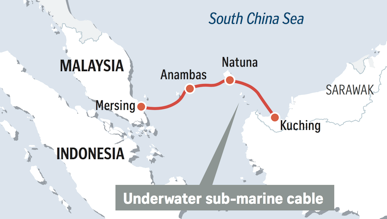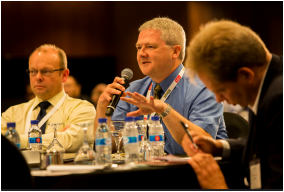|
The Indonesian Military (TNI) has blocked a submarine optical cable project being undertaken by a Malaysia-based communications company, PT Sacofa, because the TNI considers it a violation of Indonesia’s sovereignty. Figure 1 – East-West Cable Map Source: Sacofa
TNI commander Gen. Gatot Nurmantyo inspected PT Sacofa’s servers and its fiber cables located in West Tarempa village, Siantan district, Anambas regency, Riau on Wednesday. He demanded the company shut down operations. “Under Law No.17/1985 on the ratification of the UN Convention on the Law of the Sea [UNCLOS], Indonesia gives opportunities to companies to carry out submarine optical cable installment. To do so, they must obtain permission from the country,” Gatot said in Anambas. The military commander claimed that PT Sacofa’s permit expired on November 26, 2016 but the company resumed operations on March 23, 2017. Gatot said the company’s project must be halted as it would endanger Indonesia’s security system. “The fiber optic cables and servers will be directly connected to a satellite. If more devices are added to the system, the technology will sense all vibrations from sea surface or submarines,” Gatot said. Previously the Coordinating Political, Legal and Security Affairs Ministry forbad PT Sacofa from resuming the project, alleging it would make an impact on Indonesia’s sovereignty. The issues being faced by telecommunication infrastructure specialist Sacofa Sdn Bhd in Indonesia illustrate the complexity and challenges of this business, said industry players. While a potentially lucrative and high growth business simply because of the increase in Internet usage the world over, the laying of undersea fibre optic cables requires not only specialized skills but also the ability to work with the various government authorities to ensure that the process does not transgress on any domestic rules and regulations as well as international law, said one expert. Sacofa now faces a challenge in dealing with the Indonesian authorities over its undersea fibre optic cable located off Anambas and Natuna islands in the Indonesian province of Riau. A source familiar with the installation of such cables and with the East-West Submarine Cable System, the fibre optic cable installation in question, said Sacofa now faced the challenge of convincing the Indonesian government that the fibre optic cable, including a landing station located on Anambas, posed no threat to Indonesia’s national security or sovereignty. Sacofa was given the permit to proceed with the building of the installation in June 2002 and the entire project was completed in two years. It is understood that there is another cable, the 20,000km long South-East Asia–Middle East–Western Europe 5, being installed that could provide the same services. Sacofa could not be reached for comment. Sacofa, which did not get the renewal of a permit to operate the cable after it expired last Nov 26, resumed operating the installation from March 23, according to a Jakarta Post report dated April 7. The Jakarta Post said in a follow up story published yesterday that Sacofa was in violation of maritime law as all the infrastructure must be below the sea’s surface. According to the Jakarta Post, a 1982 agreement between Malaysia and Indonesia for the placement of such cables does not include a landing station, an installation that connects the undersea cable to land. Meanwhile, Kuching-based Sacofa’s managing director Mohamed Zaid Mohamed Zaini remains confident that Indonesian authorities’ concerns will be resolved. He said in a recent press release that it was just a matter of explaining thoroughly that the Indonesian islands concerned were merely a connection point where no landing rights permits were required. “We are on-hand to provide any further information or specifications to the authorities to facilitate the resolution to this misunderstanding,” Zaid said. Cahya Mata Sarawak Bhd owns a 50% stake in Sacofa, with Sarawak’s State Financial Secretary being the next largest shareholder at 20.51%. Celcom Axiata Bhd has 15.12% stake in the company followed by Sarawak Information Systems Sdn Bhd (7.57%) and Yayasan Sarawak (6.80%). Source: Jakarta Post, The Star Online ANALYSIS: What should have been a straightforward bureaucratic process of license renewal has escalated into a dramatic incident which may now only be resolved at the upper echelons of the Indonesian and Malaysian governments. The initial Jakarta Post story implies that Sacofa was in the process of constructing this ostensibly domestic submarine fiber optic cable system which connects Eastern Malaysian territories to Western Malaysia but it has actually been in operation since 2002, with the cable landing station on Indonesian territory an integral part of the system. It is unusual for a domestic system to have a landing on foreign territory, presumably for the purposes of signal re-generation which is cheaper to do on land than using an undersea repeater, but the Indonesian permit for Sacofa to do this appears to have been in place since 2002. It is not clear whether Sacofa simply forgot to renew this license or whether the Indonesian authorities were slow in processing Sacofa’s application for renewal. It appears that Sacofa initially turned off the system and then re-commissioned it some months later which would imply that they knew there was a problem but decided to force the issue. They probably did not calculate that the Indonesian military would step in. The claims of Gen. Gatot Nurmantyo are somewhat preposterous. The cable has been in operation for fifteen years. If the Malaysians had the intent to use the cable for some nefarious purpose by attaching listening devices, they would have done it by now. As suggested by some of the comments on the Jakarta Post article, the General may be taking the opportunity to do some political grandstanding. Indonesian permitting for submarine cables is notoriously difficult. Application processing can take an inordinate amount of time and there are plenty of rumors in the market about corrupt practices being required to achieve timely permitting. Nevertheless, Sacofa is probably now ruing the decision to re-commence operations.
0 Comments
Leave a Reply. |
Julian Rawle, AuthorThought leadership articles and commentary on developments related to the subsea fibre optic cable industry can be found here. Archives
February 2018
Categories |




 RSS Feed
RSS Feed